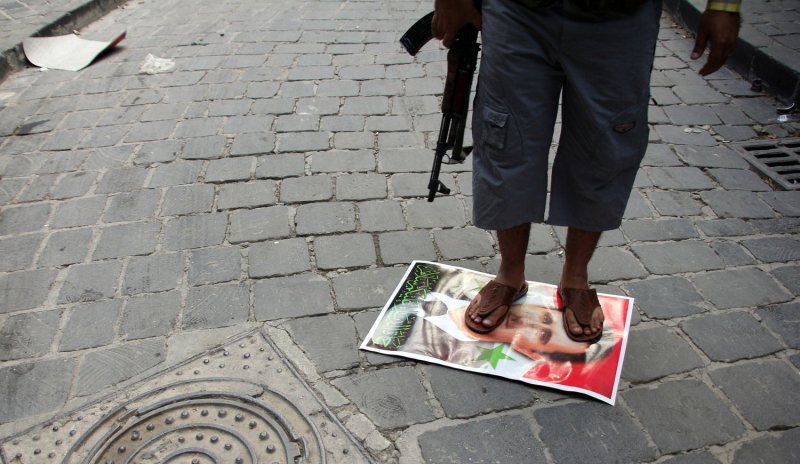A Syrian rebel fighter stands on a picture of Syrian President Bashar al-Assad, in the Old Town of Aleppo, Syria, September 12, 2012. UPI/Ahmad Deeb |
License Photo
BRUSSELS, Dec. 4 (UPI) -- NATO ministers Tuesday approved sending Patriot missiles to Turkey to protect it from stray Syrian missiles as Damascus faced further military setbacks.
NATO foreign ministers meeting in Brussels said they were gravely concerned about repeated violations of Turkey's territory but said the installation does not foreshadow a no-fly zone as rebels and government troops continue to battle for control of Syria.
"Turkey has asked for NATO's support, and we stand with Turkey in the spirit of strong solidarity," NATO Secretary-General Anders Fogh Rasmussen told a press conference.
"To the Turkish people we say: We are determined to defend you and your territory. To anyone who would want to attack Turkey we say don't even think about it."
Turkey asked for the Patriots last month. The missile batteries will be manned by the countries providing the equipment and will be used strictly for defensive purposes, Rasmussen said.
The decision came as Syrian activists said fighting was in its fifth day near the international airport in Damascus as government forces tried to push out rebels and reverse their recent tactical gains, The New York Times reported.
Despite superior weaponry and reported heavy losses among rebel forces, the government's counteroffensive hasn't dislodged the insurgents in the southern suburbs of Damascus, observers said.
The Syrian Network for Human Rights said it documented 198 deaths, including eight women and 17 children, Monday. The organization said 63 people died in Damascus proper and 106 died in the capital's suburbs.
A Russian political analyst told the Times people sent by Russia's leadership who met with Assad two weeks ago described the Syrian leader as someone lacking hope for either victory or escape.
"His mood is that he will be killed anyway," Fyodor Lukyanov, editor of a Russian foreign affairs journal and the head of a policy group, said. Lukyanov said an "extremely bold" diplomatic move likely was the only way to convince Assad he could leave power and survive.
On the diplomatic front, a senior Turkish official said Russia agreed to a new diplomatic venture to try to persuade Assad to give up power, indicating a possible softening in Russia's steadfast support for the government, the Times said.
In Istanbul, Russian President Vladimir Putin and Turkish Prime Minister Recep Tayyip Erdogan said Monday they had agreed on a new approach to resolving the conflict.
"We are neither protecting the regime in Syria nor acting as their advocate, but remain worried about Syria's future," Putin said during a news conference with Erdogan.
Russian Deputy Foreign Minister Mikhail Bogdanov said Moscow would meet with Syrian opposition groups based inside the country in the coming months.
U.S. President Barack Obama and Secretary of State Hillary Clinton Monday warned that use of chemical weapons on Syrian citizens would cross a "red line" and bring a strong international response.
"I want to make absolutely clear to [Assad] and those under his command: The world is watching," Obama said at a nuclear non-proliferation conference in Washington. "The use of chemical weapons is and would be totally unacceptable. And if you make the tragic mistake of using these weapons, there will be consequences and you will be held accountable."
The Syrian Foreign Ministry, reiterating earlier statements, told state television the government "would not use chemical weapons, if it had them, against its own people under any circumstances."
In Damascus, a prominent Syrian Foreign Ministry spokesman reportedly left the country amid conflicting accounts that he was fired or had defected.
The United Nations said Monday it was evacuating non-essential staff from Syria, and the European Union said its activities in Damascus would be culled "to a minimum," the Times said. A Russian official spoke for the first time about the possibility of evacuating Russian citizens.
Bogdanov told ITAR-Tass Russia would provide assistance to its citizens wanting to leave Syria.
"Due to the situation, we recommend Russian citizens not to go to Syria," Bogdanov said.















